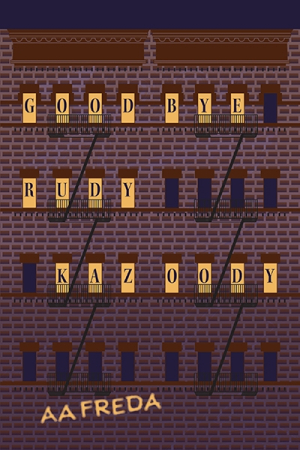Goodbye, Rudy Kazoody
At turns comedic, profound, hypersexed, imaginative, and jagged, this is a thoughtful tribute to the youths of the Kennedy era.
Goodbye, Rudy Kazoody is an American coming-of-age novel set in an Italian immigrant neighborhood. A. A. Freda captures an early 1960s adolescence through the misadventures of a Bronx gang. A checkered plot disrupted by late tragedy reveals the heart of an antiheroic son.
The book begins when the teenage leader of the Black Knights, Spike, experiences a mental breakdown. His cousin Joey, the narrator, explains what led to the crisis. Episodic chapters follow the pair while exposing different sides of Spike’s character. Joey’s position as a bystander allows him to dart between truth and mystery, turning Spike into near-legend. In one especially apt remark, Joey pinpoints the essence of the book: “You can spend your entire life trying to analyze Spike, and you’d be no closer than when you first met him.”
A respected fighter in the neighborhood, a bibliophile who hides his college aspirations, a benefactor to those in need, and the head of his household after his father’s departure, Spike is known for his leadership and has a wild, romantic reputation. His public persona, however, masks his troubled intelligence. He is a fascinating lead in a story that highlights how even revered figures can suffer from doubt.
Despite the plot’s early emphasis on Joey’s family, social hierarchies, sexual voyeurism, and nostalgic scenes that include boxing matches in Madison Square Garden and a high school dance, it’s the portrait of Spike that lingers. His story is sometimes lost amid subplots that feature other gang members. Extensive passages that dwell on adolescent longing and the pursuit of neighborhood girls are also distracting, though their inclusion reflects the narrator’s preoccupations. Where the book succeeds in painting a vibrant atmosphere, it falters in giving Spike’s storyline the necessary weight that the dramatic ending demands.
When the work does focus on Spike, fragments of his backstory suggest reasons for his guarded nature. Noteworthy scenes—such as his own recollection of life in Italy, his fascination with a bucolic painting, and the struggle to reconcile his views on God—humanize him and add depth to everyday encounters. A strong theme of isolation holds the work together; Spike’s story is a touching reminder that appearances seldom reflect a person’s entirety. The teens who surround him also, in their own ways, struggle with the pull between acceptance and remaining faithful to themselves.
This thoughtful tribute to the Kennedy era transcends time and place to explore how key relationships—and their fallout—can force people into adulthood. At turns comedic, profound, hypersexed, imaginative, and jagged, Goodbye, Rudy Kazoody illustrates a pivotal season in its characters’ lives.
Reviewed by
Karen Rigby
Disclosure: This article is not an endorsement, but a review. The publisher of this book provided free copies of the book and paid a small fee to have their book reviewed by a professional reviewer. Foreword Reviews and Clarion Reviews make no guarantee that the publisher will receive a positive review. Foreword Magazine, Inc. is disclosing this in accordance with the Federal Trade Commission’s 16 CFR, Part 255.

